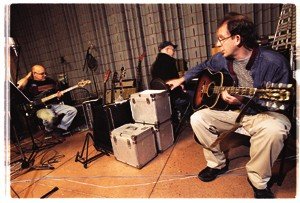 I told him, “Well, you can’t sing, but it’s the WAY you can’t sing that’s good. It has a sort of dark, sleazy feel to it. … a combination of Leonard Cohen and Tom Waits.”
I told him, “Well, you can’t sing, but it’s the WAY you can’t sing that’s good. It has a sort of dark, sleazy feel to it. … a combination of Leonard Cohen and Tom Waits.”
― Gaff Music label head Scott Beal on novelist Madison Smartt Bell (pictured above, with Don Dixon)
I find that during Lockdown, I more often want to put on music when I’m in cooking, unloading the dishwasher or just puttering around in the kitchen, and yesterday I put on “Forty Words for Fear,” which strikes me as about the perfect soundtrack for the period we’re living through. (I recommend cuing it up before you read further.)
This is a CD, recorded over a week or so in a North Carolina studio in December 2002, that celebrates collaboration on multiple levels – the music you’re hearing (or would be) actually started as a character in a novel, Anything Goes by Madison Smartt Bell. Writing the story of Jesse, a young guy playing guitar in a Tennessee band playing gigs in local dives like the Black Cat, Bell heard the music Jesse was writing, and turned to his friend, poet Wyn Cooper, to collaborate on a series of songs.
I’d never met Bell when I was given the book to review for the San Francisco Chronicle in June 2002, but loved the novel and gave it a rave, though given that Bell and I became pretty good friends for a while there, it’s funny to read how I gushed, but did the reviewer’s trick of folding in one paragraph of knuckle-rapping, noting where Bell let the dive-bar-appropriate language of the book slip a little with words like “quarrel” and “logy.”
“Most good rock ‘n’ roll is about pain, in the end,” I wrote in that review. “That’s especially true at the blues end of the spectrum, where Jesse lives. He turns out to be a kid with talent, much more so than seems obvious early in the book, but it’s only by getting down to the nitty-gritty of dealing with his own pain that he gives himself a shot at connecting with his own mojo.”
I was working at the New Yorker that summer, on a book project, and pitched the Talk of the Town desk on a piece about Bell and the book – turns out, Scott Beal of Gaff Music wanted to get Bell and Cooper in the studio together with Don Dixon and Mitch Easter, both dynamite musicians who had co-produced early REM records. The Talk piece never ran, alas, but I did have the pleasure of being there in the studio watching this odd and glorious collection of talent coming together.
“That hang-dog expression Bell attributed to the guitar-for-hire in Anything Goes might have some autobiography to it,” I wrote in the long piece I did on those sessions for the local weekly, Indy Week. “Bell has one of those great faces, part basset hound, part treasured teacher, that’s the last one you’d single out in a room full of people, but somehow also the first one you notice. He’s understated and low key without in any way undercutting his quiet authority. If he was going to show up in a Hollywood movie, he’d be the new kind-hearted teacher of the dark arts at Hogwarts Academy, teaching Harry and his mates levitation or shape-shifting, all without an ounce of self-congratulation.”
Getting to know Don Dixon was a great pleasure of the week.
“Your enemies, the people who think you suck and are the worst piece of shit ever to crawl out from under a rock, they define you more than the people who just slavishly love you,” he told me sometime past 2 a.m. one of those nights in the studio. “They make the people who DO get you have something to care about. If you can get some real hatred built up, then you have a chance of defining yourself as a personality.”
If you’ve got a hankering, and the time to do it, I highly recommend reading the novel with the music in the background as soundtrack. As Beal said, Bell’s voice has a dark quality, all its own. You’ve never heard a novelist sing quite like this. And Cooper, his collaborator, who also featured in the long piece I did, recently had his first poem published in the New Yorker . Congratulations, Wyn!
– Steve Kettmann
Want to receive Steve’s blog on writers and writing by email? Sign up below.

